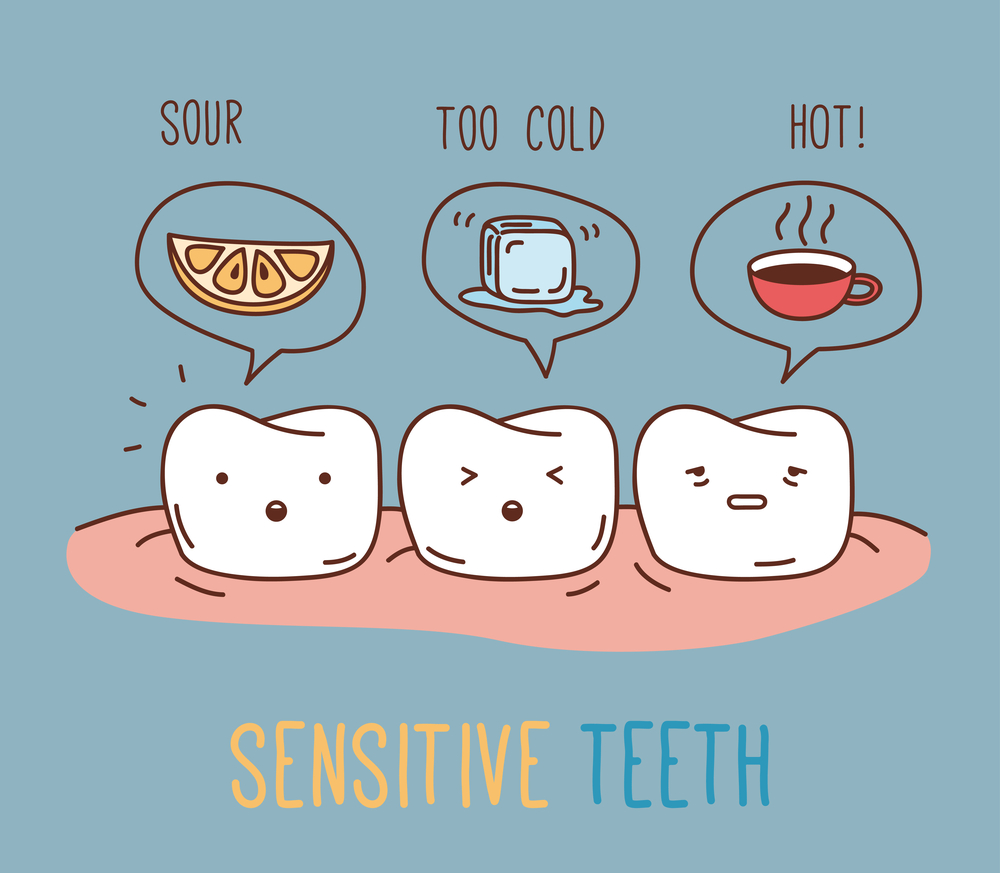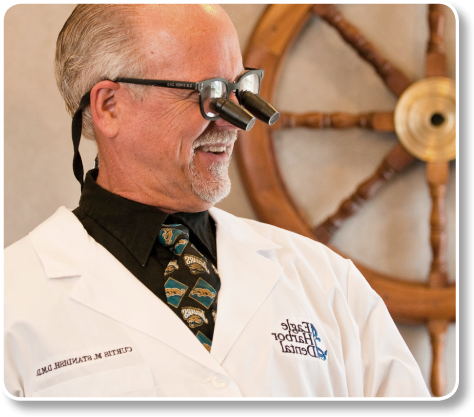Everything You Need to Know About Tooth Sensitivity
Feb 6, 2021

Does eating hot or cold foods cause your teeth to hurt? Do you feel pain in your teeth after brushing or flossing? Do sweet or acidic foods make your teeth ache? If so, you may have tooth sensitivity.
What Are the Symptoms of Tooth Sensitivity?
Tooth sensitivity sufferers experience tooth discomfort or pain when they’re exposed to a specific trigger. Most commonly, the triggers for tooth sensitivity include:
- Hot foods and drinks
- Cold foods and drinks
- Cold temperatures
- Cold water
- Sweet foods and drinks
- Acidic foods and drinks
- Mouthwash containing alcohol
Tooth sensitivity can vary in intensity. Sometimes, the pain may be intense, but other times it may be mild or nonexistent. Just because the pain has gone away doesn’t mean that the sensitivity has gone away. You’ll still want to talk to your dentist about the sensitivity.
Is Tooth Sensitivity a Symptom of a Cavity?
Tooth sensitivity can be a symptom of other dental issues, such as a cavity, gum disease, or damaged enamel. Typically, if tooth sensitivity is a symptom of something worse, then it’s localized to the affected area. For example, if you have a cavity, only the tooth with the cavity would be sensitive. You should talk to your dentist about any tooth sensitivity you experience, but it’s especially important if it might be a sign of a dental problem that should be addressed immediately.
What Causes Tooth Sensitivity?
The causes of tooth sensitivity can range from brushing habits and teeth grinding to cavities and gum disease. Typically, tooth sensitivity caused by another dental issue is localized to one area of the mouth. If you’re brushing too hard or grinding your teeth, the sensitivity will more likely be all over your mouth.
Worn Enamel
Tooth sensitivity can result if the enamel on your teeth is worn or damaged. Enamel that is worn down can expose the roots of your teeth, which are sensitive. Enamel, also called dentin, is the protective layer that coats your teeth. If it wears away, then there’s nothing left protecting your teeth from bacteria and other dangers. Worn enamel can not only result in tooth sensitivity to hot and cold temperatures but also increases the risk of cavities and other tooth damage.
What Causes Enamel to Wear Away?
Enamel can begin to wear away because of either foods in your diet or health conditions or factors. Foods that can cause worn enamel are:
- Sugary foods
- Starchy foods (ex. white bread)
- Soda pop
- Acidic foods
- Citrus fruits
- Fruit drinks, including juices
Other factors that can cause worn enamel can include:
- Grinding your teeth
- Acid reflux
- Bulimia
- Low flow of saliva (a symptom of diabetes)
- Regular use of aspirin, antihistamines, or other medications
Damaged Teeth
If your tooth or a crown on your tooth is cracked, that tooth may be subject to sensitivity. The enamel on the tooth is meant to protect it but if the tooth is damaged, the inside is exposed to bacteria, acid and sugars from food, and temperatures that can cause pain. A cracked tooth can also lead to a cavity, which can also result in tooth sensitivity and pain.
Cavities
If you have a cavity, the tooth with the decay may be more sensitive than other teeth. Typically, when you have a cavity, there’s a hole or other damage to your tooth, exposing the sensitive root and insides. Tooth sensitivity caused by a cavity will result in pain or discomfort on the tooth with the cavity.
Gingivitis
Gingivitis occurs when your gums become inflamed. If left untreated, it can turn into periodontitis, which is a more serious infection of the gums. Gums can recede due to the inflammation or infection of gingivitis, which then would expose the roots of your teeth.
Receding Gums
Your gums are the pink tissue in which your teeth are embedded. It covers the roots of your teeth and protects them. However, gums can recede due to poor oral health, smoking, diseases such as diabetes or HIV, over-aggressive brushing, or hormonal changes. If your gums have receded, that can expose the roots of your teeth. Without the protection of the gums, roots are sensitive to cold, heat, and more.
Sinus Infections
Sinus infections can cause tooth pain because of the pressure that builds up within your sinus cavity. This pressure is a result of inflammation in the sinuses caused by the infection. It can put pressure on the nerve endings in your teeth, causing pain and sensitivity in the teeth and jaw.
Grinding Your Teeth
Clenching or grinding your teeth occasionally won’t cause major problems. However, continually doing it over a long period of time can wear away the protective enamel. Grinding your teeth can also cause pressure on your teeth. As a result, it can cause tooth sensitivity and pain.
Brushing Your Teeth Too Hard
Although brushing hard sounds like it would just make your teeth even cleaner, it can actually damage your teeth. If you brush too hard, it can damage the enamel on your teeth, which protects them. It can also create a negative effect on your gums.
Tooth Whiteners
If you use whitening strips, get your teeth professionally whitened, or use another form of bleach tooth whitening, you may experience sensitivity in your teeth. Tooth sensitivity caused by whitening is temporary and usually goes away once you stop using the whitening product.
How Can I Prevent Tooth Sensitivity?
You can help prevent tooth sensitivity by practicing proper oral health care. Visit your dentist for regularly scheduled cleanings. Avoid trigger foods like sugary or acidic foods. These foods cause sensitivity but they’re also bad for your teeth. Properly caring for your teeth and keeping them healthy can go a long way towards preventing sensitivity. Especially important is ensuring the long-term health of your enamel.
Avoid Trigger Foods
Acidic and sugary foods can cause pain once you already have tooth sensitivity. However, they can also cause the tooth sensitivity in the first place. These foods can help to wear away the enamel on your teeth and also create a breeding ground for bacteria in your mouth that puts you at risk of cavities. Avoiding these foods before your teeth are sensitive can help to prevent it.
What Should I Avoid Eating?
To protect your teeth, especially the protective enamel, you should avoid the following foods:
- Soda pop
- Alcoholic beverages
- Hard candies
- Sour candies
- High-sugar carbs
- Bread (white bread especially)
- Citrus fruits
- Oranges
- Lemons
- Limes
- Fruit juice
- Lemon juice
- Cranberry juice
- Apple juice
- Orange juice
- Ice
- Potato chips
- Dried fruit
Highly sugary or starchy foods promote the growth of bacteria in the mouth. Acidic foods can wear away at your teeth. Hard foods like ice or hard candies can chip or crack teeth or, if you have crowns, damage the crown. Sticky foods like gummy candies or dried fruits can stick to your teeth and leave behind sugar.
What Should I Eat Instead?
Certain foods are better to eat because they can help prevent bacteria and fight the acid that can wear away at your teeth. These foods can include:
- Cheese
- Yogurt
- Milk
- Vegetables and fruits that are rich in fiber
- Sugarless gum
- Green tea
- Black tea
Go Easy on the Brushing
It may seem counterintuitive to ease up on brushing. However, brushing too hard can wear away at your protective enamel, which can expose the tender parts of your teeth. Enamel can’t be replaced once it’s gone, so it’s important not to brush so hard that you wear it away.
What Kind of Toothbrush Should I Use?
To brush properly so that you don’t damage your teeth, it’s important to first choose a toothbrush with soft bristles. Hard bristles can wear away at your enamel. Even though it seems counterintuitive, harder bristles don’t clean better than soft bristles and can actually do more harm than good.
When it comes to other toothbrush features, such as electric, handle flexibility, and toothbrush head size, that can vary depending on personal preference, so long as the toothbrush has soft bristles.
How Do I Brush Properly?
Brushing your teeth properly is essential to your oral health and to preserving your enamel. Brush softly in circular motions. Think of brushing as a massage action rather than scrubbing. Scrubbing is what can damage your teeth. It’s also important to make sure to brush the gum line. You can angle the toothbrush at 45 degrees so you can brush the part of the tooth that’s underneath the bottom of the gums.
When Should I Brush My Teeth?
You should brush your teeth twice daily for at least two minutes each time. It can be a good idea to set a timer to make sure you’re brushing for long enough. Remember not to brush your teeth immediately after eating. Food you eat may contain acids that can harm your teeth and if you brush right away after eating, you’ll be brushing that acid into your teeth. Waiting at least fifteen minutes will let the saliva in your mouth get rid of the acid first.
Sealants
Sealants are a protective coating that is painted onto your teeth by a dentist. Sealants are put onto tooth chewing surfaces in order to prevent cavities. The sealants work by shielding the teeth from food, germs, and bacteria.
How Can I Treat Tooth Sensitivity?
Once you already have tooth sensitivity, there are some treatments you can undergo to ease the pain. Some of these involve changing your diet or stopping behaviors that cause the sensitivity, such as brushing your teeth to hard, using teeth whiteners, or grinding your teeth. Other treatments may include dental treatments in order to repair damaged teeth or address gingivitis.
See Your Dentist
The most important step in treating your tooth sensitivity is to see your dentist. A dentist can help you determine the cause of the sensitivity and recommend an appropriate treatment. If the sensitivity is caused by gingivitis or tooth damage, the dentist may be the only source of treatment. Some sensitivity may need to be treated with a procedure such as filling a cavity, repairing a crown, or performing a root canal.
Special Desensitizing Toothpaste
Desensitizing toothpaste can help to dull the pain you might experienced in your teeth. It may take several uses for the effects to start working. Because there are many different types of desensitizing toothpaste, you may want to ask your dentist for a recommendation, even though most of these toothpastes are available over-the-counter.
Fluoride Gel
Fluoride is commonly used during regular dental cleanings. If you’re experiencing tooth sensitivity, your dentist may be able to prescribe fluoride for use at home as well. Fluoride can help to strengthen your enamel, which can protect your teeth.
For informational purposes only.













